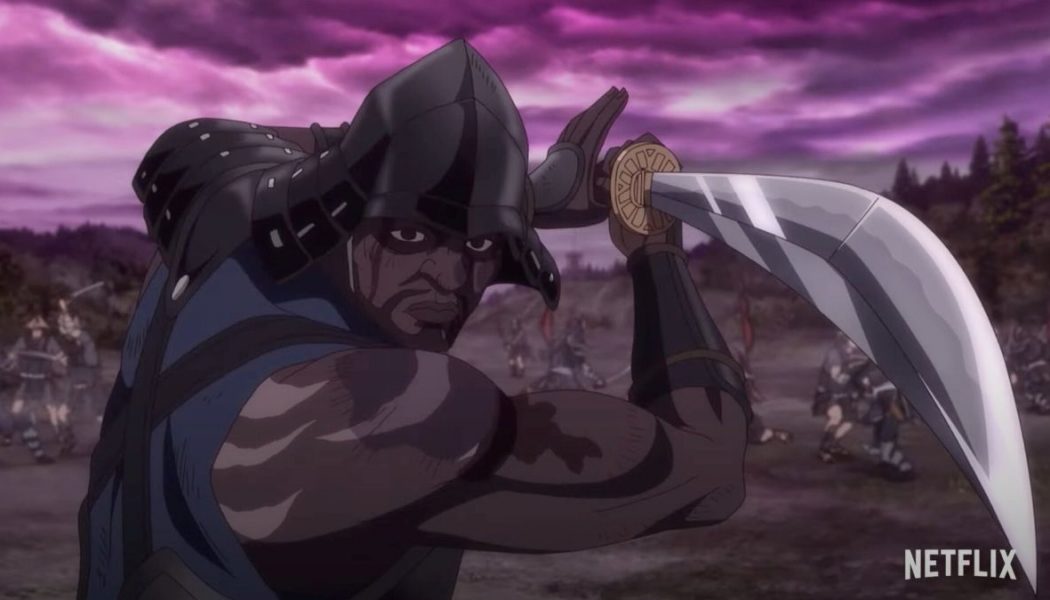
The Pitch: Yasuke (LaKeith Stanfield) isn’t your typical feudal samurai warrior, and no one will let him forget it: He’s Black. During an age of honor, tradition, and uniformity, the infamous Black Samurai’s high rank makes him a target in a world full of bigotry. But after a lifetime of pain and blood, all he wants to do is live peacefully. Unfortunately for him, that doesn’t seem to be what fate has in mind.
Based on the historical figure of the same name, Yasuke follows the samurai as he abandons retirement to help transport a mysterious, magical child (Maya Tanida) to safety. The series combines the creative vision of LeSean Thomas with the musical stylings of Grammy Award-nominated producer Flying Lotus for a show that transcends the expectations of the genre.
The Greatest Ronin Never Known: The entertainment industry has been trying to tell the story of Yasuke for years with the short-lived Afro Samurai and the now-canceled live-action film, set to star the late Chadwick Boseman. Yasuke, an African man who had served a high-ranking feudal lord during the 16th century, is one of the earliest known records of African descent in Japan. Now, backed by a predominantly Black creative team, the story is set to introduce a new generation of young, Black teenagers to anime.
Related Video
The actual story of Yasuke largely remains a mystery to Japanese historians, which gives the creative team a lot of leeway when it comes to creating this adaptation. Choosing to base the series in an alternate reality lends itself to the otherworldly lore surrounding the character, but it also introduces different layers of conflict and character motivation that don’t always work. There are often abrupt transitions between light exposition or shonen-style fight scenes that one might expect from a story with magic and quick cuts to incredibly gory samurai fights. While many of these shots include stand-out animation, there is an obvious tonal dissonance in the story.
Not-Your-Father’s Samurai Anime: Samurai animes are known for their traditional approach and relatively formulaic storylines, but Yasuke melds the traditional tropes with a Southern Bronx flair. LeSean Thomas, the creator and director, is responsible for bringing the historic tale of Yasuke to life alongside renowned producer Flying Lotus. The result is a unique blend of mature, shonen-style action and an invitingly modern soundtrack that is sure to entice Western audiences. Similar in originality to the universally adored soundtrack of Cowboy Bebop, Flying Lotus combines nostalgic synth with roots in both traditional Japanese and African soundscapes.
The action ranges from classic shonen-style fighting to brutal moments of violence and gore. The animation comes from MAPPA (Attack on Titan: The Final Season) and includes a number of unexpected, cinematic framing choices. From intense tracking shots to impressive fight choreography, the short series is full of stand-out visual moments. The choice to include such visceral, dramatic gore is refreshing for a subgenre that can often appear diluted for more general audiences. Thomas is not afraid to crack a joke and then jump to a flashback scene of Yasuke cutting someone in half.
Six (Episodes) Under: Still, Yasuke cuts itself short with only six, 30-minute episodes in the series. The three-hour runtime is far too short for the amount of information and exposition required to fully appreciate the show. Yasuke and Saki might be able to develop a decent connection, but there are far too many characters to care about in such a short period of time. There’s also very little explanation around the rules or understanding of magic within the series’ universe, which turns Saki into an overpowered, underdeveloped Mary-Sue. With such stand-out visuals and representation, adding additional episodes to flesh out characters and relationships would elevate the show into a cult classic. Unfortunately, unless the creative team is willing to go back into the existing arcs, it might be too late to rekindle the same fire.
The Verdict: With big names like LaKeith Stanfield and Flying Lotus attached to the project, Yasuke is sure to make waves in the anime community. But its short runtime leaves a lot to be desired for anyone looking past the first layer. The show tries to pack two separate arcs into six episodes, which doesn’t give them enough time to flesh out the characters or establish cohesive worldbuilding. It’s easy to see the potential Yasuke might have achieved given another six episodes. Still, in light of the current political climate that’s working to dismantle institutionalized racism, it’s refreshing to see showrunners branch out the anime genre and include diverse characters in leading roles. There’s definitely going to be an outcry for more episodes, and hopefully, Netflix is able to see the same potential.
Where’s It Streaming?: All six episodes of Yasuke will honorably arrive on Netflix on April 29th.
Trailer:










